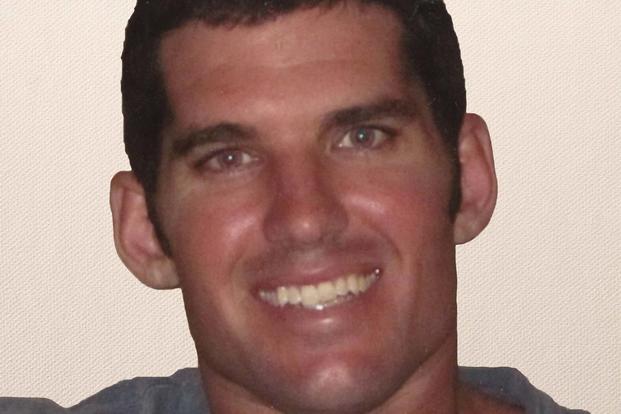The U.S. hit the Al Qaida in the Arabian Peninsula (AQAP) terror group in Yemen on Thursday with wide-ranging airstrikes that targeted the same general area where Navy SEAL William "Ryan" Owens was killed.
The Pentagon said in a statement that more than 20 early morning airstrikes, using a mix of manned and unmanned aircraft, were aimed at AQAP fighters, equipment, infrastructure, heavy weapons systems and fighting positions in the Yemeni governorates of Abyan, Al Bayda and Shabwah. The Associated Press, citing Yemeni officials, said the strikes concentrated on an area where the three governorates converge.
It was in central and mountainous Al Bayda province on Jan. 29 that Owens, 36, of Peoria, Illinois, a member of Navy SEAL Team 6, was killed in what U.S. Central Command described as a "ferocious firefight" during a raid on an AQAP compound. The raid was personally authorized by President Donald Trump and resulted in the first combat casualty of his tenure.
The airstrikes Thursday in areas under AQAP's control marked the first U.S. combat action in Yemen's civil war since the Jan. 29 raid and were coordinated with Yemen's nominal president, Abdrabbuh Mansur Hadi, according to the Pentagon statement by Navy Capt. Jeff Davis, a spokesman.
Hadi assumed the presidency after Ali Abdullah Saleh was ousted from office in 2012 in the aftermath of the Arab Spring uprisings. Saleh has since aligned himself with Shia Houthi rebels who drove Hadi's forces from the capital, Sanaa, in 2015. Hadi, backed by Saudi Arabia and the United Arab Emirates with support from the U.S., has been attempting to regain power ever since.
Amid the turmoil in Yemen, AQAP has evolved from being an isolated band of terrorists bent on spectacular overseas plots into a virtual mini-state in areas it controls, according to the International Crisis Group. The growing strength of AQAP has come about despite years of U.S. drone strikes and occasional raids by special operations commandos.
In 2011, a U.S. drone strike killed Anwar al-Awlaki, a U.S. citizen and AQAP's chief
propagandist. The Jan. 29 raid on the Yakla district of Al Bayda governorate reportedly killed his eight-year-old daughter, Nawar al-Awlaki.
In addition to Owens' death, three U.S. troops were wounded in the attack on the AQAP compound and at least two others were injured in the hard landing of a Marine MV-22 Osprey supporting the mission. The $70 million Osprey could not be flown out and was later destroyed by a Marine AV-8B Harrier jet.
The White House and Pentagon have repeatedly described the raid as a success despite Owens' death, in that the mission gathered valuable intelligence on AQAP's activities and planned operations.
On Thursday, CNN, citing U.S. officials, said the U.S. is seeking to find and monitor various individuals based on intelligence from computer discs and other material brought back from the raid, which critics have charged was planned in haste and poorly coordinated.
There are three separate investigations of the raid underway, according to the Pentagon.
One is an Article 15-6 fact-finding investigation by a senior officer of how the Jan. 29 mission was carried out. A separate aircraft mishap investigation is underway on the loss of the Osprey. A third investigation on civilian casualties from the raid is also ongoing. According to the Pentagon, at least 14 civilians were killed in the mission along with at least 16 militants.
However, the SEAL's father, William Owens, has demanded a broader investigation into what he told the Miami Herald was a "stupid" mission. Owens told the newspaper that he refused to meet with Trump at Dover Air Force Base in Delaware during the "dignified transfer" of his son's remains.
In the emotional highlight of his address to a joint session of Congress on Tuesday night, Trump honored Owens' widow, Carryn, and defended the worth of the mission in which he gave his life.
To prolonged applause, Trump diverted the attention of the audience to the House gallery, where Carryn Owens was seated in the section reserved for First Lady Melania Trump.
"We are blessed to be joined tonight by Carryn Owens, the widow of a U.S. Navy special operator, Senior Chief William "Ryan" Owens. Ryan died as he lived -- a warrior and a hero -- battling against terrorism and securing our nation," he said.
Trump quoted from what he said Defense Secretary Jim Mattis had just told him. "Ryan was a part of a highly successful raid that generated large amounts of vital intelligence that will lead to many more victories in the future against our enemies."
The president said, "Ryan's legacy is etched into eternity. For as the Bible teaches us, there is no greater act of love than to lay down one's life for one's friends. Ryan laid down his life for his friends, for his country, and for our freedom. We will never forget him."
-- Richard Sisk can be reached at Richard.Sisk@Military.com.




























